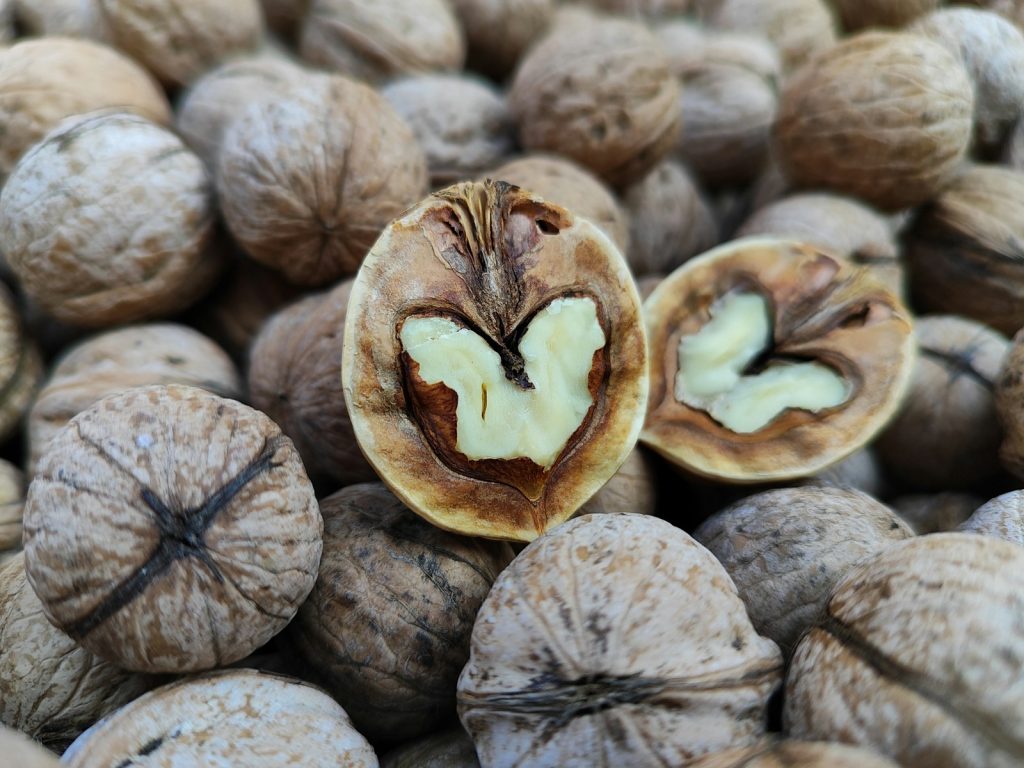14 Best Foods for Enhancing Cognitive Abilities

Cognitive function plays a crucial role in our daily lives, from memory and problem-solving to focus and creativity. As we age, maintaining cognitive health becomes increasingly important, and what we eat can significantly impact our brain’s ability to function efficiently. Scientific research has shown that certain foods contain nutrients that directly support brain health, improve neurotransmitter function, and protect against cognitive decline.
In this article, we will explore the 14 best foods that enhance cognitive abilities, providing the nutrients needed for optimal brain performance and mental clarity.
1. Fatty Fish
Fatty fish like salmon, mackerel, and sardines are some of the best foods for brain health due to their high levels of omega-3 fatty acids. Omega-3s, particularly DHA (docosahexaenoic acid) and EPA (eicosapentaenoic acid), are essential for maintaining the structure of brain cells and improving neuronal communication.
Omega-3s are known to support cognitive function by reducing inflammation, which can lead to cognitive decline. Research suggests that regular consumption of fatty fish can improve memory, enhance focus, and even protect against Alzheimer’s disease and other forms of dementia. Additionally, DHA is critical for neuroplasticity, the brain’s ability to reorganize itself and form new neural connections, essential for learning and memory retention.
2. Blueberries
Blueberries are rich in antioxidants, particularly flavonoids, which have been shown to boost cognitive function by protecting the brain from oxidative stress. Oxidative stress is a significant contributor to brain aging and can lead to neurodegenerative diseases like Parkinson’s and Alzheimer’s.
The flavonoids in blueberries improve blood flow to the brain, enhance neural signaling, and stimulate the growth of new brain cells in areas critical for memory, such as the hippocampus. Regular consumption of blueberries has been linked to improved memory, concentration, and decision-making skills.
3. Walnuts
Walnuts are one of the best nuts for brain health, thanks to their high concentration of alpha-linolenic acid (ALA), a type of omega-3 fatty acid that supports cognitive function. Walnuts also contain high levels of antioxidants, vitamin E, and polyphenols, all of which protect the brain from oxidative damage and inflammation.
The combination of omega-3s and antioxidants in walnuts helps support neurotransmitter function, which is essential for memory and cognitive performance. Studies have shown that people who regularly consume walnuts experience slower rates of cognitive decline and better cognitive flexibility—the ability to switch between different tasks smoothly.
4. Dark Chocolate
Dark chocolate, particularly varieties with a high cocoa content (70% or higher), is packed with flavonoids and antioxidants that support brain health. These compounds improve blood flow to the brain, promoting better cognitive function and protecting brain cells from oxidative stress.
The flavonoids in dark chocolate also stimulate the production of serotonin and dopamine, two neurotransmitters that regulate mood and cognitive function. Consuming dark chocolate in moderation has been linked to enhanced memory, attention, and problem-solving abilities.
5. Broccoli
Broccoli is a cruciferous vegetable known for its high levels of vitamin K, antioxidants, and compounds like glucosinolates that benefit brain health. Vitamin K plays a key role in supporting brain structure and protecting brain cells by preventing oxidative stress.
Additionally, glucosinolates break down into compounds that help preserve acetylcholine, a neurotransmitter necessary for memory and learning. Adequate levels of acetylcholine are associated with better cognitive performance and may help protect against age-related cognitive decline.
6. Turmeric
Turmeric is a powerful spice that contains curcumin, a compound known for its anti-inflammatory and antioxidant effects. Curcumin can cross the blood-brain barrier, allowing it to directly influence the brain by reducing inflammation and supporting the growth of new brain cells.
Curcumin has been shown to increase levels of brain-derived neurotrophic factor (BDNF), a protein that enhances neuroplasticity and supports learning and memory. Curcumin also boosts levels of serotonin and dopamine, improving mood and mental clarity. Studies suggest that turmeric can help delay the onset of neurodegenerative diseases like Alzheimer’s by protecting brain cells from damage.
7. Pumpkin Seeds
Pumpkin seeds are packed with magnesium, iron, zinc, and copper, all of which are essential for brain health and cognitive function. Magnesium supports neuronal health, while zinc plays a crucial role in neurotransmission and memory formation. Iron helps carry oxygen to the brain, promoting cognitive clarity, and copper aids in controlling neurotransmitter signaling.
Pumpkin seeds are also rich in antioxidants that protect the brain from free radical damage and inflammation. Regular consumption of pumpkin seeds can improve memory, concentration, and overall cognitive function.
8. Oranges
Oranges and other citrus fruits are excellent sources of vitamin C, a powerful antioxidant that plays a critical role in protecting brain cells from oxidative stress. Vitamin C helps reduce inflammation, supports neurotransmitter function, and enhances immune health.
Higher levels of vitamin C are linked to better cognitive performance, including improvements in memory, focus, and problem-solving. Regular consumption of oranges can also support brain plasticity, making it easier to learn new skills and retain information.
9. Eggs
Eggs are an excellent source of several nutrients that are crucial for brain function, including choline, B vitamins, and vitamin D. Choline is essential for the production of acetylcholine, a neurotransmitter that regulates memory and mood.
B vitamins, such as B6, B12, and folate, support neurotransmitter synthesis and reduce homocysteine levels—high levels of which are associated with cognitive decline and dementia. Vitamin D plays a protective role by supporting brain cell communication and reducing inflammation.
Regular consumption of eggs can help improve cognitive flexibility, memory, and mental clarity.
10. Spinach
Spinach, along with other dark leafy greens, is rich in vitamin K, folate, beta-carotene, and lutein—all nutrients that support brain health and protect against cognitive decline. Folate helps regulate homocysteine levels, while lutein and beta-carotene have been shown to improve cognitive performance by protecting brain cells from oxidative damage.
Studies have found that individuals who consume spinach and other leafy greens regularly tend to have better memory and cognitive abilities as they age. Spinach also supports neuronal communication and helps maintain the structure of brain cells.
11. Green Tea
Green tea contains caffeine and L-theanine, both of which have profound effects on brain function. While caffeine provides a short-term boost in focus, memory, and reaction time, L-theanine promotes calmness and mental clarity without causing drowsiness.
Green tea is also rich in antioxidants called catechins, which help protect brain cells from oxidative stress and reduce inflammation. These compounds work together to enhance cognitive function, improve mood, and protect against neurodegenerative diseases like Alzheimer’s and Parkinson’s.
12. Quinoa
Quinoa is a highly nutritious whole grain that is rich in complex carbohydrates, fiber, and antioxidants. The fiber in quinoa helps regulate blood sugar levels, providing sustained energy to the brain without causing spikes and crashes.
Quinoa is also a good source of magnesium, which is essential for brain function and helps maintain proper neurotransmitter activity. Additionally, quinoa contains flavonoids that have been linked to improved cognitive function and reduced risk of age-related cognitive decline.
13. Avocados
Avocados are packed with monounsaturated fats, which support blood flow to the brain and help maintain the integrity of brain cells. These healthy fats are essential for maintaining cognitive function, especially as we age. Avocados are also rich in vitamin K and folate, both of which help protect against stroke and improve memory.
The high levels of antioxidants in avocados protect brain cells from oxidative stress, further promoting cognitive clarity and mental sharpness.
14. Grapes
Grapes, especially red and purple varieties, are rich in resveratrol and flavonoids, powerful antioxidants that protect the brain from oxidative stress and inflammation. Resveratrol has been shown to improve memory and cognitive performance by promoting blood flow to the brain and supporting neuronal health. The polyphenols in grapes help protect brain cells from free radical damage, which can contribute to cognitive decline as we age. Additionally, resveratrol has been linked to improving brain plasticity, which is the brain’s ability to adapt and form new neural connections, essential for learning and memory.
Grapes are also known to reduce inflammation in the vascular system, improving overall circulation, which benefits the brain by ensuring a steady supply of oxygen and nutrients. Regular consumption of grapes can help maintain mental sharpness, improve memory recall, and slow down age-related cognitive decline.
Conclusion
The food we eat plays a critical role in supporting and enhancing cognitive abilities throughout our lives. By incorporating these 14 brain-boosting foods into your daily diet, you can improve memory, focus, mental clarity, and even protect against neurodegenerative diseases like Alzheimer’s and Parkinson’s.
Each of these foods is rich in essential nutrients—such as omega-3 fatty acids, antioxidants, vitamins, and minerals—which are crucial for maintaining neuronal health and promoting neuroplasticity. Whether you’re adding fatty fish for its omega-3s, blueberries for their flavonoids, or turmeric for its anti-inflammatory properties, every small change can have a profound impact on your brain health.
A diet rich in these nutrient-dense foods, combined with other healthy lifestyle habits such as regular exercise, adequate sleep, and stress management, can significantly boost cognitive function and help you maintain mental acuity as you age.



